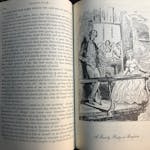"The Current," by Tim Johnston. (HighBridge, unabridged, 14 ½ hours.)
Past and present merge in "The Current," Tim Johnston's atmospheric, exquisitely suspenseful novel of two murders separated by 10 years. Audrey's friend Caroline is driving her from their Southern college up to Minnesota, where Audrey's father, a former sheriff, is dying. On the way, the young women narrowly escape violent molestation by two louts in an Iowa gas station — only to have their car maliciously bumped onto the fragile ice of the Black Root River, under which runs a powerful current. Tragedy ensues.
Ten years earlier, up in Audrey's hometown, a young woman was drowned in the same river. The two episodes develop into an increasingly interwoven mesh of victims, suspects, motives, revenge and grief. Audrey, a determined sleuth, is intent on getting to the bottom of both incidents.
Sarah Mollo-Christensen delivers the general narration in a low, gentle voice, modulating her tones unobtrusively to capture the dialogue among the characters. This is a masterly performance of a first-rate thriller, one which completely dissolves the barrier between story and listener.
"The Forgiven," by Lawrence Osborne. (Random House Audio, unabridged, 10 ¾ hours)
Lawrence Osborne's 2012 novel "The Forgiven" — a tale of clashing cultures, mutual misunderstanding and death set in Morocco — is finally available as an audiobook. David Henniger is an alcoholic London society doctor; his wife, Jo, is a blocked writer. Driving on a lonely road to a grotesquely extravagant three-day party, David, not quite sober and bickering with Jo, hits a young man, killing him instantly. When the couple show up at their hosts' elaborately restored estate with a corpse, no one is pleased, especially the help, already repulsed by the party itself — a bacchanal of booze, drugs and sexual excess.
The dead man's father appears, insisting that David travel back with him to his remote village. For what — compensation, atonement, revenge?
Narrator Ralph Lister gives marvelous renditions of the diverse characters in accent and mood, from the many Moroccans to David, who alternates between a choleric Colonel Blimp and "a plump, sullen toad."
"The Heartbeat of Wounded Knee," by David Treuer. (Penguin Audio, Unabridged, 17 ¾ hours)
David Treuer, an Ojibwe novelist and critic, here offers a counternarrative to "Bury My Heart at Wounded Knee," Dee Brown's bestselling 1970 history of the obliteration of American Indian life and culture. Treuer's book, "The Heartbeat of Wounded Knee," is a colorful, thoroughly engaging mix of history, memoir, reportage, interview, anecdote and observation.
Although Treuer addresses the injustices and atrocities committed against America's indigenous people, he focuses more closely on what has persisted in Indian life, showing the role of Indians in the nation's history as a whole. Traveling throughout the country to reservations, rural areas, towns and urban Indian enclaves, Treuer talks with men and women engaged in a variety of pursuits, including cage-fighting, leech trapping, culinary arts and legal representation.
Narrator Tanis Parenteau — a member of the Métis Nation of Alberta and of Cree and Sioux descent — delivers this revelatory book with dispatch and confidence.
Minnesota native Katherine A. Powers reviews for Barnes & Noble, the Star Tribune and elsewhere. She writes this column for the Washington Post.




